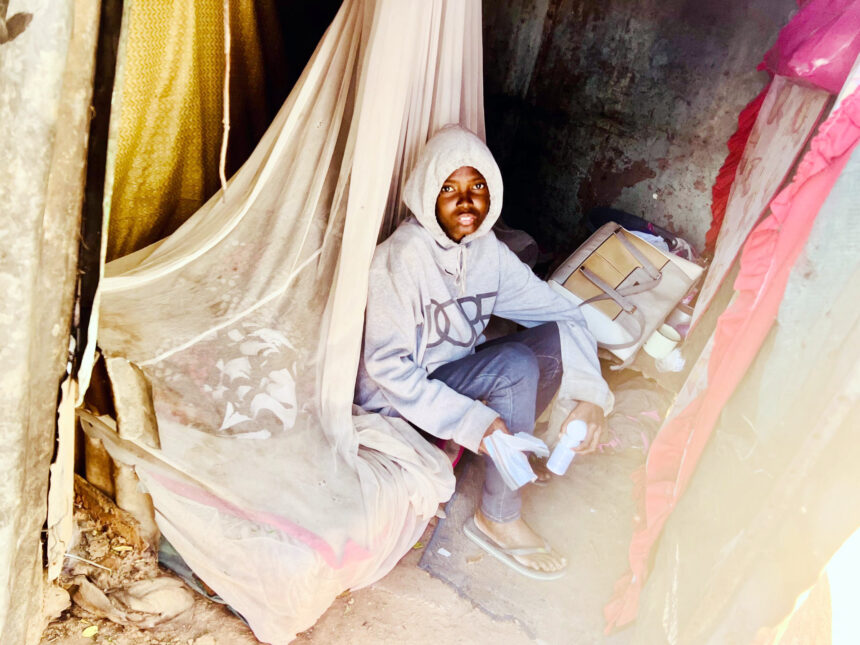TSUMEB – Dressed in a grey jersey and faded blue skinny jeans, a 22-year-old woman sits silently outside her grandmother’s house in Tsumeb.
Her right foot tucked onto a plastic chair, the other resting on the dusty ground, her black shoes are worn, give a glimpse into the life of Charlotte Gutases.
Her hand supports her chin, her eyes fixed at nothing, as if to say she has been defeated by life.
She wraps a cloth tightly around her empty stomach and sits quietly on a plastic chair outside, hoping a stranger might pass by and give her tea or anything to eat. At just 22, Gutases has become a face of forgotten suffering – sick, hungry, and silently waiting for life to show her mercy.
Born with a chronic illness and orphaned at a young age, her life has been a painful story of survival.
After enduring years of physical abuse at the hands of her aunt’s partner at Wixueb, a farm outside Tsumeb, she finally fled, escaping not to freedom but into deeper vulnerability.
Gutases has known little, if any, comfort in life. Now, she sleeps on the bare floor of a tiny cubicle room her grandmother offered – a space barely fit for shelter, let alone healing.
With no job and on TB treatment, and with no support system, Gutases is not only grappling with the trauma of her past but is also exposed to biting insects, severe hearing loss, and a weakening voice.
Her story is one of pain, survival, and a desperate cry for help in a society that seems to have closed its ears.
Speaking up
Speaking to New Era from the Samastan informal settlement in Tsumeb on Tuesday, Gutases, in a faint, blocked voice, shared her harrowing journey, assisted by her 75-year-old grandmother, Selma Garosas, and cousin Fransina Garoses.
“I don’t even remember what grade I ended in,” she said. “After what I went through, I didn’t want to continue with school.”
Her grandmother said she is trying to buy corrugated zinc sheets to expand the living space, but there is not enough money.
Her situation worsened when she developed a painful pimple in one of her ears, which later burst and turned into an open wound. The wound led to permanent hearing loss. At the state hospital, doctors declared her eligible for a government disability grant and she was successfully registered through the Ministry of Gender Equality in November last year.
“When I was diagnosed with TB, everything changed,” she said. “I started craving food like meat and macaroni. I can’t eat pap and sugar anymore. My heart just refuses it,” she said.
One grant, 12 mouths
Although she now receives a monthly grant, it does not go far. The money feeds 11 other children who also live with her paternal grandmother.
According to her cousin, when there is no food, they buy groceries on credit from a nearby supermarket and pay at the end of the month. The shop has placed a N$600 limit on their bill.
“She doesn’t have a fridge, so when she gets meat on credit, she grills it immediately using a braai stand. Her condition demands good food, but she can’t store anything long. Even then, she only gets enough for one day,” the cousin said.
The grandmother herself survives on a State grant, but that money has been swallowed up by two loans. One was from the Build Together housing project, where she secured a one-room plot. The second from Nampost to finish building the house.
“Little money is left after loan deductions. At least the other children can eat pap. But for Charlotte, she needs proper food and that’s what we can’t afford,” she said.
In the past two weeks, Gutases has not had a decent meal. When New Era visited, a bowl of untouched dry pap sat in her room.
“Sometimes she skips her medication because it’s too much to take on an empty stomach,” the grandmother added.
“I’m left with very little money,” she said. “But for Gutases, it’s difficult. She has special food needs.”
Daily life
Maria only enters her cubicle room at night, and even then, she says she doesn’t sleep well because of hunger.
“I wake up as early as 05h00 to sit outside on the plastic chair and hope someone will come by with tea or something to eat,” she said.
Her cousin confirmed this behaviour, saying that sitting outside in the cold, wrapped in a cloth around her stomach, is her silent way of expressing hunger or sadness.
“She doesn’t speak much when she’s hungry. She just wraps that cloth tightly around her and sit in silence. That’s how we know she hasn’t eaten for days,” she said.



